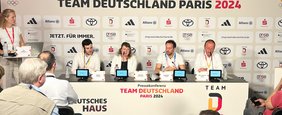
Die französische Anti-Doping-Organisation (AFLD), die Internationale Test Agentur (ITA), die Nationale Anti-Doping Agentur aus Österreich (NADA Austria) und die Nationale Anti Doping Agentur Deutschland (NADA Deutschland) luden Journalistinnen und Journalisten am 28. Juli 2024 zu einer gemeinsamen Pressekonferenz im Deutschen Haus mit Unterstützung des Deutschen Olympischen Sportbundes (DOSB) ein.
Um eine weltweite Harmonisierung der Anti-Doping-Arbeit voranzutreiben, kommt der internationalen Zusammenarbeit besondere Bedeutung zu. Daher arbeiten die Anti-Doping-Organisationen eng zusammen. Jérémy Roubin (AFLD), Benjamin Cohen (ITA), Michael Cepic (NADA Austria) und Eva Bunthoff (NADA Deutschland) stellten die Anti-Doping-Arbeit vor und während der Olympischen Spiele vor.
Vor-Olympisches Anti-Doping-Programm
Auch bei der Vorbereitung auf die Olympischen Spiele in Paris stand die Präventionsarbeit im Fokus der Anti-Doping-Organisationen. Athletinnen und Athleten sind sowohl bei Workshops und Infoständen, als auch über spezielle e-Learning-Programme geschult und informiert worden.
Ein zielgerichtetes Dopingkontrollprogramm ergänzte die präventiven Anti-Doping-Maßnahmen. Die sogenannte Pre-Games Expert Group bestehend aus internationalen Anti-Doping-Expertinnen und Experten der NADA Deutschland, USADA, CHINADA, World Athletics hatte unter der Leitung der ITA Empfehlungen für die Umsetzung des Anti-Doping-Programmes für die Olympischen Spiele in Paris ausgearbeitet. Zur Erarbeitung der Empfehlungen wurden u.a. Anpassungen früherer Risikobewertungen vor den Olympischen Spielen identifiziert, Informationen wie die Dopinghistorie der teilnehmenden Länder, die Dopinghistorie der olympischen Sportarten/Disziplinen sowie weitere Informationen aus den verschiedenen Ländern gesammelt und potenzielle Testlücken identifiziert. AFLD, NADA Austria und NADA Deutschland haben im Vorfeld der Olympischen Spiel in Paris ein umfangreiche Testprogramm organisiert. Sowohl im unmittelbaren Vorfeld als auch in der langfristigen Vorbereitung sind unangekündigte und unberechenbare Kontrollen ein wichtiger Bestandteil zielgerichteter Anti-Doping-Arbeit.
AFLD, NADA Austria und NADA Deutschland haben ihre nationalen Athletinnen und Athleten vor den Olympischen Spielen getestet, zusätzlich hat die ITA im Vorfeld von Paris Dopingkontrollen bei Athletinnen und Athleten verschiedener internationaler Verbände durchgeführt. Bei all diesen Proben wurden die notwendige Zusatzanalysen durchgeführt, Analysedaten des Biologischen Athletenpasses (ABP: Athlete Biological Passport) ausgewertet und Proben in die Langzeitlagerung überführt.
Die Ergebnisse des weltweiten vor-olympischen Testprogrammes hat die ITA unter folgendem Link zusammengestellt: ita.sport/news/the-ita-concludes-paris-2024-pre-games-anti-doping-program-reports-that-close-to-90-of-athletes-were-tested-at-least-once-ahead-of-olympics/
Olympisches Anti-Doping-Programm
Mit der Eröffnung des Olympischen Dorfes am 18. Juli 2024 übernahm die ITA im Auftrag des Internationalen Olympischen Komitees (IOC) und in Zusammenarbeit mit der AFLD das Anti-Doping-Programm in Paris. Erstmalig gibt es in Paris ein Doping Control Coordination Center (DCCC), das mit internationalen Anti-Doping-Expertinnen und Experten verschiedener Nationaler Anti-Doping Organisationen (NADOs) besetzt ist. Auch die NADA Deutschland ist Teil des DCCC-Teams. Aufgabe des DCCC ist die Umsetzung des Dopingkontrollplans der ITA sowie das Management von Dopingkontrollpersonal vor Ort.
Übersicht Kontrollzahlen NADA Deutschland
Die 429 Olympia-Teilnehmenden wurden 1.176 mal kontrolliert. Es wurden 1.779 Proben (1.173 Urin-, 584 Blut- und 22 Dried Blood Spot-Proben) durchgeführt. Auch die 44 Ersatzathletinnen und -athleten wurden 103 mal kontrolliert.
-- English --
Joint press conference of AFLD, ITA, NADA Austria, NADA Germany
The Agence Française de Lutte contre le Dopage (AFLD), the International Testing Agency (ITA), the National Anti-Doping Agency Austria (NADA Austria) and the National Anti Doping Agency of Germany (NADA Germany) invited journalists to a joint press conference at the German House on July 28, 2024 with the support of the German Olympic Sports Confederation (DOSB).
International cooperation is particularly important in order to promote global harmonization of anti-doping work. This is why the anti-doping organizations work closely together. Jérémy Roubin (AFLD), Benjamin Cohen (ITA), Michael Cepic (NADA Austria) and Eva Bunthoff (NADA Germany) presented the anti-doping work before and during the Olympic Games.
Pre-Olympic anti-doping program
Education was also the focus of the anti-doping organizations during the preparations for the Olympic Games in Paris. Athletes were trained and informed at workshops, information booth as well as via special e-learning programs.
A targeted testing program complemented the education anti-doping measures. The so-called Pre-Games Expert Group, consisting of intentional anti-doping experts from NADA Germany, USADA, CHINADA and World Athletics, drew up recommendations for the implementation of the anti-doping program for the Olympic Games in Paris under the leadership of the ITA. In order to develop the recommendations, adjustments to previous risk assessments prior to the Olympic Games were identified, information such as doping history of the participating countries, the doping history of the Olympic sports/disciplines and other information from the various countries was collected and potential testing gaps were identified.
AFLD, ITA, NADA Austria and NADA Germany have organized an extensive testing programme in the run-up to the Olympic Games in Paris. Unannounced and unpredictable tests are an important part of targeted anti-doping work, both in the immediate run-up and in the long-term preparations. AFLD, NADA Austria and NADA Germany have tested their national athletes before the games, additionally the ITA has performed tests on athletes for different international federations ahead of Paris. For all these samples, the necessary additional analyses were carried out, analysis data from the Athlete Biological Passport (ABP) was evaluated and samples were transferred to long-term storage.
The results of the worldwide pre-Olympic testing program have been compiled by the ITA under the following link: ita.sport/news/the-ita-concludes-paris-2024-pre-games-anti-doping-program-reports-that-close-to-90-of-athletes-were-tested-at-least-once-ahead-of-olympics/
Olympic anti-doping program
With the opening of the Olympic Village on July 18, 2024, the ITA took over the anti-doping program in Paris on behalf of the IOC and in cooperation with the AFLD. For the first time, there is a Doping Control Coordination Center (DCCC) in Paris, which is staffed by international anti-doping experts from various NADOs, as well NADA Germany. The task of the DCCC is the implementation of the ITA Test Distribution Plan and allocating and managing sample collection personnel on field.
Overview of NADA Germany test figures
The 429 Olympic participants were tested 1,176 times. A total of 1,779 samples (1,173 urine samples, 584 blood samples and 22 Dried Blood Spot samples) were taken. The 44 substitute athletes were also tested 103 times.